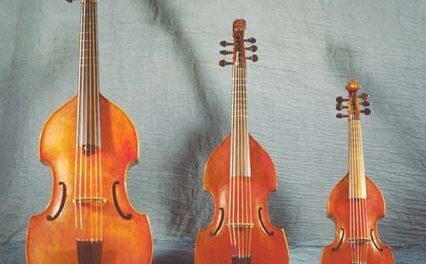An overflow audience in the Ackland Art Museum galleries was part of an interdisciplinary event. One of the museum’s treasures is Jacopo Amigoni’s painting Venus Disarming Cupid which once belonged to the soprano castrato Farnelli, perhaps the greatest of that gelded order. Four university departments, Art, English, History, and Music, have shared an extensive interwoven project around this connection. The all-student UNC Baroque Ensemble, led by faculty cellist Brent Wissick, presented a broad program of music by composers closely associated with Farnelli, who was born Carlo Broschi (1705-1782). Four arias by such composers were shared equally between two sopranos. Wearing period costume, actor John Pringle walked back and forth between the two overflow galleries, impersonating the great castrato reminiscing about the highlights of his long and successful career. The fine script was written by associate curator Tim Riggs. A central conceit of Riggs’ “docudrama” was the irony of a castrato possessing a painting about love.
A well-phrased brief fanfare, played on a long natural trumpet by Blake Meulmester, opened the concert. It began and ended with a mix of movements from sonatas and concerto grossi by Handel and Joesph Herrando. Balances, timbres, and intonation were generally fine with very accomplished solo playing. Continuo duties were by three harpsichordists, and one or two cellos. The lowest ranged string instrument was a fretted violone.
Farinelli starred on the European stages until 1737. Handel was Kapellmeister to George, Elector of Hanover and followed him to London when he became George I of Great Britain. With the King’s patronage and prominent subscribers, Handel formed The Royal Academy of Music, a company to perform Italian opera. It was the rage, for a while. The Prince of Wales, who delighted in obstructing his father, supported a rival company, The Opera of the Nobility from 1733-1737. Farinelli was brought in along with singers hired away from Handel’s company. Typical fare were operas set to libretti by Pietro Metastasio such as Semiramide by Nicola Porpora (1696-1766). To add insult to injury, Farinelli starred in one of Handel’s own operas, Ottone. Moving to Spain, he served as the private singer for the depressed King Phillip V and producer of operas for 20 years. Farinelli served Phillip’s successor as “prime minister” in all but name. Siroe by Johann Adolph Hasse (1699-1783) and Siria by Francesco Maria Veracini (1690-1768) were premiered by The Opera of the Nobility in London and were among many operas revived by Farinelli in Spain.
Pringle’s recollections as Farinelli were divided among four Interludes and a Postlude. The interlude covered a significant period of the castrato’s life and served to introduce an aria from an opera by a composer associated with that time span. Vocal duties were shared between sopranos Lisa Chensvold and Abbey Thompson.
Chensvold sang “Bel piacer saria d’un core” (“Good pleasure, you came from one’s heart…”) from Porpora’s Semiramide robustly with a well-supported dramatic soprano voice. Her timbre was pleasing and her enunciation was excellent. Her highs were bright and brilliant. The mood of “Cara, tan el mio petto” (“Dear one, you make my heart desire you…”) from Handel’s Ottone is more sedate than that of the first aria and gave less scope for Thompson to show off her full range. Chensvold brought out all the charged drama within “La sorte mia tiranna” (“The tyrant makes me unable to go on…”) from Hasse’s Siroe. Thompson has an unusual voice that does not put all of its cards upon the table. Up until this point, most of her music called for her lower mezzo-soprano range. Indeed, I had made up my mind she was a mezzo. Imagine my surprise when she revealed her full hand over the course of “Son sventurato ma pure, o stele” (“I am piteous but grateful, o stars…”) from Veracini’s Siria. After cruising along in “low-gear” she soared up and launched some pretty brilliant vocal fireworks. Both singers tastefully varied the traditional de capo repeats of their arias modestly.
Besides singing for King Phillip V, Farinelli also played an unusual five-stringed violin for him. Joseph de Herrando (1720/21-1763) composed a set of sonatas dedicated to the castrato that employs this instrument. Alas, violinist Josh Kaye had only a normal violin to play the Allegretto from Herrando’s Sonata in C Major but he was able to bring out its elegant gallant charms. He paired stylishly with Kristina Jacobson on baroque flute for an Andante/Allegro from Handel’s Trio Sonata in B Minor, Op. 2, No. 1. The main theme is well known. Violinists Leah Peroutka (who was leader), Jordan Delphos, and Marnie Cheshire acquitted themselves well in their stints as soloists in earlier musical excerpts.
The program ended with Pringle, as Farinelli, again regarding the Amigoni painting. He drew attention to the title Venus Disarming Cupid and the fact that there are two gods involved, Venus the goddess of Love and Apollo the god of music. Farinelli’s castration could be regarded as a “disarming” to enhance his musical ability to sing about love. The press of writing did not allow me to stay for a panel discussion involving faculty and students from all four departments.











